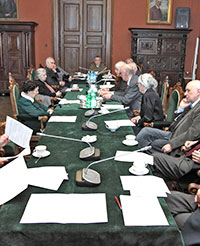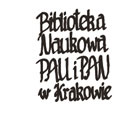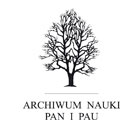PAU today
| zob.: Structure PAU |
The Polish Academy of Arts and Sciences is made up of six faculties: Linguistics, History and Philosophy, Science and Technology, Natural Science, Medicine, and Creative Arts.
The PAU faculties represent an important platform for opinion-forming in the arts and sciences, yet in its activities the heaviest weights are lifted by the commissions, of which there are thirty-nine. They group together researchers from various fields of science, who, in the main, are not members of PAU. The themes addressed by twenty-three of the commissions, that is, the majority, fit the disciplinary profile of the faculties they are classified as belonging to. Faculty I has 5 Commissions (Classics, Art History, Modern Languages, Slavonic Culture, and Communication Ethics), Faculty II has 10 (Central Europe, Eastern Europe, Prehistory of the Carpathians, Culture and History of the Jews, Law, History of Wars and Military Science, Ethnography, Economics, Media Studies Archaeology of Mediterranean Countries, and Biography), Faculty III has 3 (Astrophysics, Complex Systems, and Technical Sciences), Faculty IV has 5 (Geoinformatics, Agricultural, Forest, and Veterinary Sciences, Quaternary Palaeogeography, Developmental Biology, and Geography); Faculties V and VI have not formed commissions.
There are ten commissions that function outside the faculty structure, which are known as inter-faculty commissions. The themes they address are of an interdisciplinary nature and they cross the disciplinary boundaries marked by the various faculties. They report directly to the PAU Council. They are: History of Science, Threats to Civilisation, School-Textbook Evaluation, European Affairs, Philosophy of Science, Research into the Polish Diaspora, Anthropology, Ergonomics, Culture and Media Management, and the Polish CIHEC (Commission Internationale d’Histoire Ecclésiastique Comparée) Subcommission.
The following commissions operate at the arts and science bases in Katowice or Gdańsk: History of Silesia (Katowice), Natural Sciences (Katowice), Mathematics (Katowice), Law (Katowice), and Kashubia (Gdańsk). The PAU faculties and commissions are more or less active depending on the specifics of the discipline concerned. Some hold up to ten sessions annually, as well as national and international gatherings and conferences. In terms of publications, their output can be substantial.
Of the inter-faculty commissions, those of the History of Science, European Affairs, and School-Textbook Evaluation are particularly active and deserve special mention. The latter, for example, offers independent assessments of thirty, forty, and more titles for secondary schools each year. The best textbooks are awarded special PAU diplomas. There are two arts and science bases that function within the PAU structure but beyond the faculties and commissions at PAU headquarters in Kraków. They are the Katowice Arts and Science Base and the Gdańsk Arts and Science Base.
Their commissions are very active.
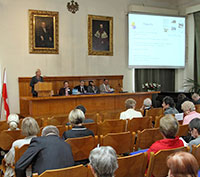 |
|
| zob.: events |
In 2019, PAU was pleased to welcome the Research Centre for Armenian Culture in Poland as part of its administrative structure. It is the only Polish scholarly institution that addresses this subject area and it maintains close contacts with specialists throughout the world. It issues the annual Lehahayer journal as well as the Lehahayer Library series of monographs.
In addition to sittings and sessions of the faculties and commissions, whose academic components are open to all scholars, PAU also organises a monthly public session (other than at vacation time), which usually attracts an audience of approximately one-hundred people. The first is the Science Café, which, as it features the very scientists doing the ground-breaking research, offers the public an unmatched level of access to scientific knowledge. The lectures and presentations are devoted to new discoveries and their practical applications. The second is We Humans , which is held in memory of prof. Jerzy Vetulani and organised by prof. Dominika Dudek of the Jagiellonian University’s Collegium Medicum. In this series, the packed audiences are addressed by authoritative and well-prepared speakers on themes that, though sometimes difficult, are always important and socially relevant.
The third is the Science Tearoom , which is a project that the Zawsze Warto [It’s always worth it] Foundation has run since 2008. It is aimed at older primary school pupils, secondary school pupils, teachers, and people not involved in education who like to escape the four walls of their rooms from time to time.
PAU is a partner of the Science Tearoom.
PAU has been publishing „PAUza Akademicka” (Academic PAUse), an online weekly devoted to scientific questions, since 2008. It is produced by former PAU president Andrzej Białas. „PAUza Akademicka” (Academic PAUse) attracts a readership of 2,000–2,500.
The Special Drawings Repository, which houses one of the two richest collections of European graphic art in Poland, forms an integral part of the library. Objects selected from the Special Drawings Repository have been displayed several times at exhibitions of the International Cultural Centre and at the Royal Castle in Warsaw.
The PAU and PAN Scientific Archive in Kraków also represents an important part of PAU’s academic resources. Though it operates within the structure of the Kraków branch of PAN, it is closely connected with PAU – both in respect of the provenance of its most valuable resources (academic legacies) and in respect of its function in the academic world. Under the auspices of PAU, the archive organises annual scientific conferences devoted to scholars and exhibitions of their legacies. It also publishes materials – particularly as part of the In the Service of Learning series. There is a close and well-established link between the PAU and PAN Scientific Archive and the very active PAU Commission on the History of Science. The archive conducts its international cooperation under the auspices of PAU.
PAU is joint owner of the Polish Library in Paris, which was established by the Great Emigration in 1838. Ownership rights are now shared with the Historical and Literary Society of Paris, which also manages the library. PAU shares in the financing of this treasury of Polish culture and supports its substantive activities through scientific projects.
Lanckoroński Photothèque, which is a separate agency of PAU, is one of the largest collections of monothematic documentary photographs in Poland. It was created as a result of the scientific journeys of Karol Lanckoroński and contains more than 43,000 photograms from the turn of the nineteenth and twentieth centuries. The compact, but highly valuable, Rozdol Library of the Lanckoroński Family (approx. 3,500 volumes), which holds reports of the proceedings of the Polish parliament, an extensive collection of calendars produced for the nobility, and sources relating to Old Poland, is also a discrete agency of PAU.
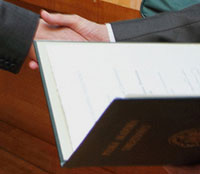 |
|
| zob.: Awards |
For very many years now, PAU has striven to reward outstanding scientific achievements. To do so, it has sought the appropriate funding beforehand. In this way, since 1997, PAU has awarded the Professor Marian Mięsowicz Prize for physics biennially; since 1998 it has awarded the Professor Tadeusz Browicz Prize for achievements in the field of medicine annually and, since 2018 – alternating with the Professor Marian Mięsowicz Prize – it has awarded the Professor Adam Bielański Prize for achievements in the field of Chemistry biennially.
In 1993, the Nicolaus Copernicus Prize, which was funded by the City of Kraków from 1873 and awarded every five years in seven academic disciplines by PAU (in earlier times known as Akademia Umiejętności: Academy of Arts and Sciences) was successfully revived. In a change introduced in 2020, the prize is now awarded in nine disciplines.
In 2009, following a seventy-year interval, the Erazm and Anna Jerzmanowski Prize, once known as the ‘Polish Nobel Prize’ was finally also revived.
It should be added that the president of PAU leads the City of Kraków Awards Commission and, of the six members of the panel of judges for the prestigious Jan Długosz Prize, which is awarded under the auspices of the Kraków Book Fair, five are PAU members.
The Polish Academy of Arts and Sciences disburses the Lanckoroński Foundation and the De Brzezie Lanckoroński Foundation Scholarships for research conducted in Rome, Vienna, London, and other centres of learning in Europe. The scholarships are awarded by a competition procedure.
Finally, by making floor space available, PAU supports work on the Dictionary of Polish Biography. The dictionary was begun by PAU in the inter-war period and then continued by PAN. It is now a joint PAU-PAN publication and is published under the honorary patronage of the Polish Parliament.




